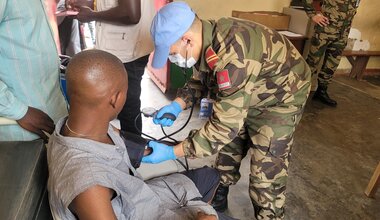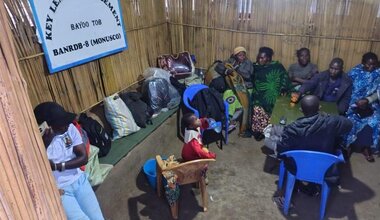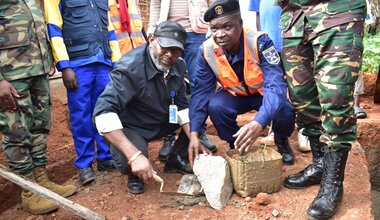DR Congo: MONUSCO Police chief expresses concern over preparations for November 2011 elections
New York, 24 February 2011 – The Police Chief of the United Nations Stabilization Mission in the Democratic Republic of Congo (MONUSCO), Abdallah Wafy, expressed concern over preparations for the country's general elections slated for November 2011. He said the Congolese National Police (PNC) was neither trained nor equipped to ensure the security of the coming polls.
"To be honest we have numerous concerns. The Congolese National Police are not [well] equipped to maintain law and order, in particular when you consider their lack of non-lethal equipment. The term 'non-lethal' refers to the means employed by a police force to maintain law and order without resorting to lethal weapons, or any equipment that can cause death. Unfortunately, the Congolese National Police is currently neither equipped nor trained for that, » MONUSCO Police Commissioner Abdallah Wafy warned in an interview with the UN News Centre.
He added: « We are trying to train these units and also to plead with partners to equip them so as to avoid the practice, often observed in Congo, of using firearms to restore order."
Commissioner Wafy stated that the Congolese National Police "has the responsibility to ensure security before, during and after the elections." MONUSCO police officers, he said, are preparing a program for ensuring upstream security of the ballot "so as to enable the different political actors to campaign, hold political rallies and ensure the deployment of electoral materials and equipment."
During the elections, he said, it will be necessary to protect the ballot boxes so as to "allow the electoral commission to do its work in peaceful and transparent conditions prevailing up to the proclamation of election results."
"In the wake of the announcement of poll results, it will also be important to maintain order and public safety in order to prevent any street outbursts, either by election winners or losers," he added.
Commissioner Wafy welcomed the progress made in the protection of populations in eastern DRC, especially in North and South Kivu. Since the mass rapes perpetrated during the summer of 2010, the UN police has established a new system for prevention and intervention in case of attacks.
Between 30 July and 2 August, mass rapes were committed in several villages in the area of Walikale, North Kivu, by 200 elements of the Mai Mai Cheka armed group and the Democratic Forces for Rwanda Liberation (FDLR). The United Nations Joint Human Rights Office (UNJHRO)'s mission of inquiry found that 235 women, 13 men and three boys were sexually abused.
"We have established communication networks linking communities so that they can alert us of the presence of armed groups responsible for looting and rape. We have drawn lessons from the events of last summer in the Walikale area, and we have put in place an early warning system allowing us to take swift action to protect civilian populations," Commissioner Wafy said.
Referring to the involvement of members of the Congolese armed forces and police in serious cases of human rights violation, UN police chief Wafy expressed satisfaction that a number of soldiers accused of committing violence against civilians in the village of Fizi during the night of 1 st to 2 nd January 2011 were being tried. (Note: On 21 February, the eleven Congolese soldiers responsible for raping some 60 women in Fizi were condemned by the military court in Baraka.).
Despite the progress achieved on security and the struggle against impunity, MONUSCO police officers still remain "vigilant".
Commissioner Wafy said: "We must recognize that the FDLR are weakened, being now reduced to some residual forces, but they still have a significant capacity to pose a threat to the population especially by staging road attacks. The security situation in the Kivus is clearly improving, mainly due to the UN Mission's efforts."
The MONUSCO police chief emphasized that the UN Mission was in the midst of a recruitment process aiming at 20 % representation of women among its personnel.
"We are trying to exert pressure on contributing countries to send female personnel. And this is not just about achieving gender balance among the UN police, but we are convinced that women have a decisive role to play in peacekeeping missions, particularly in Congo," Commissioner Wafy said.
"In the event of sexual violence, who better than a female police officer can comfort, reassure, console and listen to a woman who has been the victim of rape?" he asked, adding that "In child protection and other fields, women have an important role to play" and that "this is why we are struggling to increase women's participation in peacekeeping.."
The United Nations Police in the Democratic Republic of Congo has been deployed pursuant to Resolution 1925 of the UN Security Council. Currently 700 police elements are deployed in the country and 380 civilian experts are integrated into the Mission.
Source: UN/ New York
 UN
UN United Nations Peacekeeping
United Nations Peacekeeping






